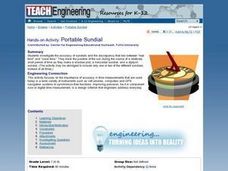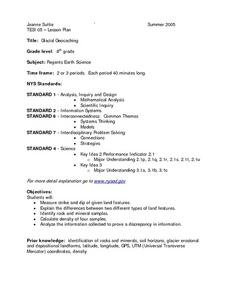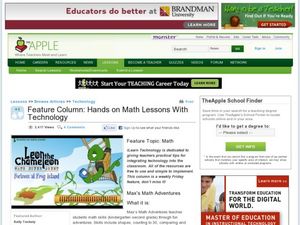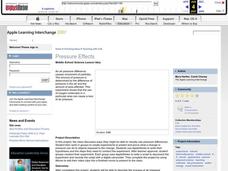Curated OER
What's the Difference?
Students explore the differences between acoustic and digital pianos. In this music lesson, students listen to an acoustic piano and digital piano. Students play both types of pianos and discuss the differences.
Curated OER
Relationship Between Addition and Subtraction
Students are taught how to add and subtract and use number sense to solve basic math problems. In this addition and subtraction lesson, students are being taught using theories from different philosophers in education. They are given a...
Curated OER
Subtracting with Regrouping
Second graders explore math functions by completing a worksheet in class. In this subtraction lesson, 2nd graders identify the techniques used to assist in subtracting multi-digit numbers. Students complete a subtraction worksheet and...
Curated OER
Cool Liquids
Chemistry neophytes use a temperature probe to assess the change as five different liquids evaporate. The implantation section suggests that they take readings every five seconds for a total of four minutes. They graph the data, look up...
Curated OER
Unit 2 Sun & Stars
Young scholars describe stellar objects using terms such as stars, planets, satellites, orbits and light. For this sun and stars unit, students research stellar objects through seven individual lessons discovering star characteristics,...
Curated OER
Defining the Difference Between Prokaryotic and Eukaryotic Cells
Young scholars examine microscopic life by conducting a scientific investigation. In this cell analysis lesson, students define the prokaryotic and eukaryotic cells and discuss their word origins. Young scholars view each type of cell on...
EngageNY
Scientific Notation
Young mathematicians learn how scientific notation is meant to save time. Part 10, out of a series of 15, asks scholars to recognize the correct use of scientific notation and finish by adding and subtracting numbers using...
Curated OER
Changes in the Copper Penny
Third graders explore the difference between a physical change in a substance and a chemical change. students study the volume, density, altering shape and chemistry of a copper penny.
Curated OER
Plant and Animal Cells
Students investigate parts of a cell. In this plant cell lesson, students determine the difference between plant and animal cells. Students discover that coral is an animal based on cell characteristics. Students create puppets to...
Curated OER
Matter
Young scholars complete a unit of activities to learn about states of matter and how to measure matter. In this matter lesson, students complete 8 lessons to learn about matter, its states, and how to measure matter.
Curated OER
One Vs. One Hundred
Students explore the concept of place value. They differentiate between digits and their values as it related to addition and subtraction. Through the use of technology and manipulatives students investigate the place value of digits by...
Curated OER
Mathematics: Prime and Composite Numbers
Sixth graders explore how to apply the commutative property and the rules of divisibility. They examine the difference between prime and composite numbers.
Curated OER
Introduction to Climatology
Students are introduced to the topic of climatology. In groups, they use the Digital Atlas of Idaho to identify the layers of the atmosphere and review concepts of weather. To end the lesson, they examine different photographs and...
Curated OER
Understanding Place Value
Fifth graders study place value. After forming teams, they play a game called, "Who Can Line Up the Number." Students observe numbers in expanded form and place representative digits in the correct order.
Curated OER
Portable Sundial
Students work together to identify the accuracy of sundials. They track the position of the sun and create a shadow plot. They discover the difference between real time and clock time.
Curated OER
Techno Hero
First graders explore digital communication by creating a slide-show presentation. In this PowerPoint presentation lesson plan, 1st graders research a famous hero using search engines and other Internet tools. Students create a...
Curated OER
Breaking Color Barriers
Students compare brown eggs and white eggs. In this color lesson, students see two different color eggs and predict what they will look like on the inside. They see that both eggs are the same and compare this to people of different...
Curated OER
Astronomy: Picture Time
Students investigate how to tell time by observing the placement of objects in the sky. Researching on the Internet, they locate the time for sunrise and sunset, the time the full moon rises, and the difference between clock and solar...
Curated OER
Glacial Geocaching
Eighth graders measure strike and dip of given land features and explain the difference between them. They also look at rock and mineral samples for indentification, along with calculating the density. Finally, information is analyzed...
Curated OER
Feature column: Hands on Math With Technology
Young learners will view a math adventures video and practice math concepts. Afterwards they will navigate through Internet sites to participate in teacher selected math adventures. This guide walks you through integrating...
Curated OER
Multiplication: Determining the Weight of Multiple Objects
Seventh graders use their knowledge of multiplication and problem solving to determine the total weight of multiple objects. In this multiplication lesson, 7th graders weigh various manipulatives, record the weight, and use...
Curated OER
Pressure Effects
Students, in groups, create experiments to predict and prove what a change in pressure can do to objects exposed to the change. They use AppleWorks to write their hypotheses and the steps they need to conduct the experiment.
EngageNY
Why Were Logarithms Developed?
Show your class how people calculated complex math problems in the old days. Scholars take a trip back to the days without calculators in the 15th installment of a 35-part module. They use logarithms to determine products of numbers and...
Curated OER
e, pi, and Exponential Functions
Learners investigate e, pi and exponents. In this calculus lesson, students define constants and non-constants using, pi, e and exponents as an example. They use the TI to work the problems in this lesson.























